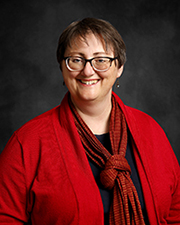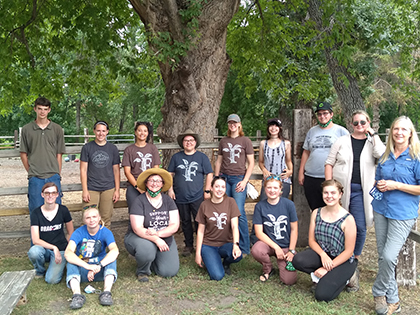For discussion
March 2022
FARRMS: Growing a More Sustainable Future for North Dakota

Stephanie Blumhagen is Executive Director of FARRMS. She is a fourth-generation farmer from Drake, ND. In 2014 Stephanie launched Meadowlark Granary, a bakery and milling business using the wheat grown on her family’s farm. She has over sixteen years of experience in nonprofit management and fundraising and is passionate about environmental and social justice, and creating a more diverse and sustainable future for rural communities. She holds master’s degrees in Public Administration and Environmental Studies from The Evergreen State College, Olympia, WA, and is a member of NDSU Extension’s Rural Leadership ND, Class IX.
......
Jen at Family Roots Farm wants to create a thriving business providing fresh local food for her family and community in the Red River Valley. Derek and Claire of Black Bison Organics and Folly Hill Farm near Bismarck are testing innovations in sustainability by marketing plant-based bio-char fertilizer and building a passive solar greenhouse. Apryl and Adam are carrying on a family legacy through “gardendwellers FARM and RANCH”, their herb farm and pastured meat operation near Bottineau. Simeon at New Roots Farm Incubator Co-op grows traditional crops from his birthplace in the Democratic Republic of the Congo so that his family and community in Fargo can enjoy familiar foods.
These farmers from diverse backgrounds are all part of the Foundation for Agricultural and Rural Resources Management and Sustainability (FARRMS). We are a nonprofit organization building a network of farmers growing a more sustainable future for our state. Through education and outreach we are creating more farmers on the land, more sustainable ag practices, and more local food in North Dakota.
For twenty-one years, FARRMS has supported beginning farmers with educational programs, peer support networks, and financing. All of our programs are grounded in principles of sustainable agriculture. We teach farmers to consider people, planet, and profit and take a holistic approach to their farming operations. We have three primary goals: we want more new farmers on the land; more sustainable farming practices; and more locally grown, fresh, nutritious food available in North Dakota’s communities.
 What is “Sustainable Agriculture”?
What is “Sustainable Agriculture”?
Sustainable Agriculture is both a philosophy and a system of farming. When we at FARRMS say that we grow sustainable agriculture, we mean that our programs teach and support people to…
…recognize that all parts of the farm are interconnected, and each part impacts the whole farm. Likewise, the farm itself is an integral part of a larger local food system.
…strive to create systems that are self-sustaining and enduring. The less a system relies on external inputs and outputs, the more likely it is to be maintained over the long term.
…consider the environmental, social, and economic consequences of their decisions and actions. How will this action create healthy land, air, and water, improve quality of life for your family and community, and generate profit over the long term?
Read more about FARRMS’ philosophy of Sustainable Agriculture.
People, Planet, Profit
FARRMS wants to see more farmers and ranchers on the land creating diverse sustainable farm businesses and providing fresh locally grown food for North Dakotans. Although the total acreage of farmland in our state is increasing, the number of farms is shrinking and our farmers are ageing. The USDA’s 2017 Census of Agriculture shows that between 2012 and 2017 the number of farms shrank by 15% and the average age of farmers increased from 55.3 to 56 (1). FARRMS aims to launch new farms, help families become more self-sufficient and strengthen rural economies.
We help farmers adopt sustainable and innovative farming practices in order to protect soil, air, water, and wildlife. Some conventional and industrial methods of agriculture have been found to deplete natural resources. A recent study shows that one-third of all topsoil in the Midwest has been lost to wind and water erosion (2). FARRMS partners with local experts in soil health and conservation to educate farmers on regenerative farming practices such as cover crops and mulch and sustainable ways to manage weeds and pests.
The farmers we serve provide fresh, local produce and meat to their communities through farm stands, Community Supported Agriculture (CSA), farmers markets, and direct sales to rural schools and hospitals. By providing fresh, locally grown food, our farmers contribute to the health and economic vitality of rural communities. Large areas of North Dakota qualify as food deserts, rural areas where people live more than 10 miles from a supermarket or a large grocery store (3). The number of grocery stores in rural towns has decreased from 137 in 2014 to 103 in 2019 (4). Often the produce that is available has been shipped for hundreds of miles and is no longer fresh. Local farmers provide fresh local produce and meat and, in some cases, employ season extension such as greenhouses to offer fresh produce in the winter. Small family farms are vital to rural communities. The income they earn is folded back into the community’s economy as they support local businesses.
The COVID-19 pandemic has illuminated challenges with large-scale food systems and dramatically increased consumer demand for locally produced and marketed food. We are educating and supporting North Dakota’s local food producers and building more resilient local and regional food systems to ensure that fresh and nutritious food is and remains accessible in North Dakota’s communities.
FARRMS Programs
We model our ethic of sustainability through our program design by offering educational programs for people at all stages of their farming journey. An aspiring agriculturalist might start as an intern, go on to launch their own farm business and when they have gained enough experience, become a mentor or intern host. In this way we support farmers through the full lifecycle of their farming career and engage farmers in growing the next generation of sustainable farmers and ranchers.
• Workshops: We offer production and business planning education for all seasons and all skill levels. Whether marketing webinars, on-farm field days, or high tunnel workshops, our classes are always farmer-led and free or low-cost.
• Internships: For those beginning to explore local food and sustainable agriculture we offer internships through our Sustainable Ag Internship program (www.farrms.org/aginterns). Interns spend a season gaining hands-on experience on a local farm. FARRMS provides a stipend, weekly online classes and summer field days. We’ve placed over 75 interns on ND farms and farmers markets since the program launched in 2013. Our interns go on to become farmers, ag educators, and local food systems leaders.
• Sustainable Farm Business Training: For those who are ready to launch, we offer the Farm Dreams farming readiness workshop (www.farrms.org/dream) and Farm Beginnings®, our sustainable agriculture entrepreneurship course (www.farrms.org/succeed). Farm Beginnings is a farm business planning course offered as an annual three-month online course. Students attend weekly classes on sustainable ag production and natural resources management, defining their values, vision, and mission, business and financial planning, marketing, connecting to resources, farm food safety, and more. Students develop a Whole Farm Plan which is a sustainability focused business plan and road map to guide their enterprise development. The course is a certified borrower training program that meets the requirements for those applying for USDA Farm Service Agency (FSA) loans. Over 180 North Dakota farmers have taken our Farm Beginnings course. FARRMS is a member of the Farm Beginnings Collaborative, fourteen sustainable farming organizations nationwide who all offer the Farm Beginnings program. Collaborative members define core standards that govern the Farm Beginnings program and share information and resources to ensure the Farm Beginnings course best meets farmers’ changing needs.
• Mentorship: Small-scale sustainable farming can be isolating and we aim to create a network of peer support for our farmers. We match beginning producers with mentors to help make farming a little easier. We offer training, support, and stipends for the mentors as our thanks for their help growing new farmers. We connect each Farm Beginnings student with a farmer mentor who understands the unique rewards and challenges of sustainable farming because they live them daily. We also offer longer term One to One Mentorships in order to support a beginning farmer through a full season of production. Our Partner Farmer initiative formally recognizes our experienced farmers as valued subject matter experts in their field. These farmers have a boots-on-the-ground perspective and a keen understanding of the challenges and rewards of the farming lifestyle gained through daily lived experience. Partner Farmers are guest speakers for Farm Beginnings® and webinars. They host interns on their farms and mentor beginning farmers. We thank them for their time and energy by providing honorariums, professional development opportunities, conference scholarships, and featuring them on our website and social media.
• Financing: A farmer may have a great farm plan, production knowledge and skills, and a supportive network, but they still need financing to make their farm dream a reality. FARRMS offers microloans up to $7500 to help farmers launch and grow their farm businesses. We also periodically offer small grants for special purpose initiatives. We connect farmers with funders such as the USDA Farm Service Agency and local economic development agencies.
Our history
FARRMS was founded in Medina, ND in 2000 in partnership with an organic certification company. The original purpose of the organization was to provide educational outreach, research, and information regarding sustainable agriculture and rural resources. In its early years FARRMS offered education on organic farming and microloans to farmers transitioning to certified organic production.
As FARRMS grew, the focus broadened to include all kinds of sustainable agriculture production and local food systems. We added the Farm Beginnings course, internship program, and began offering workshops on direct marketing, community gardens, season extension, and farm-to-school. FARRMS operated from Medina, ND from 2000 to 2017 and then from the Tuttle Rural Innovation Center in Tuttle, ND from 2017 to 2021. During the COVID-19 pandemic we moved most of our programs online and now operate as a fully remote organization with staff and board members located throughout the state.

How can you get involved?
If you or someone you know is interested in sustainable agriculture, contact Stephanie at sblumhagen@farrms.org and we’ll connect you with programs to help you grow. Perhaps you don’t want to farm but want to support sustainable agriculture in North Dakota. You can make a donation to support our work at bit.ly/GiveFARRMS or purchase t-shirts, market totes, and stickers at farrms.org/shop
If you’d like to get involved in a deeper way we are seeking new board members. Our board members care about sustainable agriculture and growing communities. They provide oversight on governance and policy matters and are champions for our cause. You can find more info at www.farrms.org/staff (scroll to the bottom) or contact sblumhagen@farrms.org.
Learn more about FARRMS

- Visit our website: www.farrms.org
- FARRMS media kit: https://bit.ly/FARRMS_ND
- Follow us on Facebook and Instagram: @farrms.nd
- Subscribe to our e-newsletter for monthly updates: https://bit.ly/FARRMS_NEWS
- Contact us: info@farrms.org or 701-480-9113
References:
(1) USDA NASS Census of Agriculture 2017 Reports by State: North Dakota Retrieved https://www.nass.usda.gov/Publications/AgCensus/2017/Full_Report/Volume_1,_Chapter_1_State_Level/North_Dakota/
(2) The extent of soil loss across the US Corn Belt. Evan A. Thaler, Isaac J. Larsen, Qian Yu. Proceedings of the National Academy of Sciences Feb 2021, 118 (8) e1922375118; DOI: 10.1073/pnas.1922375118
(3) USDA ERS Food Access Research Atlas, retrieved https://www.ers.usda.gov/data-products/food-access-research-atlas/go-to-the-atlas/
(4) ND Rural Grocers Initiative https://www.ndarec.com/ruralgrocery
